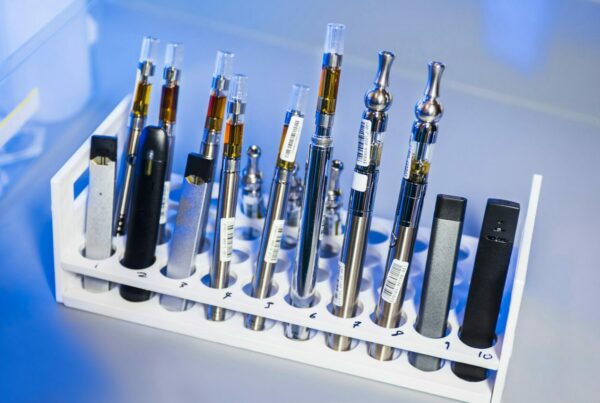N, N-Dimethyltryptamine (DMT) is a compound typically discovered in both plants and animals, known for its potent yet short-lived psychedelic effects when ingested.
There is increasing evidence to suggest that DMT, which naturally occurs in the body, plays important roles in both the peripheral and central nervous systems and may serve as a neurotransmitter.
While DMT can trigger strong psychedelic effects, it generally doesn’t result in many negative effects, except for potential cardiovascular complications when administered in large amounts via injection.
Let’s explore DMT and its various roles. These roles range from recreational use to its fascinating potential in scientific research and therapeutic uses.

A Brief Introduction to DMT: What is it?
| Attribute | Information |
| Name | N, N-Dimethyltryptamine (DMT) |
| Classification | Indole alkaloid |
| Presence | Naturally found in various plants and animals |
| Psychoactive Effects | Induces brief, potent psychedelic experiences upon consumption. |
| Consumption Method | Can be smoked, injected, or taken orally. |
| Effect Duration | Short duration, typically lasts from 5 to 30 minutes. |
| Chemical Structure | Comprises a tryptamine core with two methyl groups attached to the amine nitrogen atom. |
| Metabolism | Rapidly metabolized by the body, broken down by monoamine oxidase (MAO). |
| Cultural Usage | Historically used in various ceremonial and shamanic rituals by indigenous cultures. |
| Alternate Names | Dimitri, Fantasia, Businessman’s trip, Businessman’s special, 45-minute psychosis, Spiritual molecule |
The Importance of DMT in Mental Health
N, N-Dimethyltryptamine (DMT), a compound notable for its powerful psychedelic effects, is gaining attention for its potential benefits to mental health. Despite its conventional association with intense visionary experiences, recent research suggests a connection between DMT and mental wellness.
Influence on Psychological and Emotional Well-being
The psychedelic effects of DMT are recognized for inciting deep emotional reactions and altering states of consciousness. This could potentially pave the way for innovative therapeutic methods to address mental health problems, aid in emotional processing, and yield new perspectives on personal traumas.
Brain Function and Neuroplasticity
Research suggests that DMT can influence neuroplasticity, thereby enhancing the brain’s ability to adapt and reorganize. Investigating its impact on synaptic plasticity and neural connectivity could provide potential treatments for disorders linked to neural imbalances.
Possible Therapeutic Application for Mental Health Disorders
Initial studies underscore the potential of DMT in treating conditions such as depression, addiction, and PTSD. Its ability to incite spiritual or mystical experiences might offer a novel approach to psychotherapy and help in reconfiguring negative thought patterns.
Investigating the natural presence of DMT within the body might shed light on its role in mental health resilience, stress response, and overall psychological health. Understanding how the body controls internal DMT levels could lay the groundwork for innovative therapeutic strategies.
DMT and Mental Health Disorders
| Mental Health Disorder | Description | Effectiveness of DMT | Benefits |
| Depression | This mood disorder is characterized by persistent sadness, lack of interest, and reduced motivation | Early research suggests DMT may help alleviate symptoms by instigating profound emotional experiences | Its rapid onset and ability to spark transformative experiences may propose novel therapeutic techniques for reconfiguring negative thought patterns and enhancing emotional processing |
| Post-Traumatic Stress Disorder (PTSD) | PTSD is a mental health disorder triggered by traumatic events leading to flashbacks, intense anxiety, and intrusive thoughts | Preliminary research points to DMT’s potential to manage symptoms by inciting spiritual or mystical experiences, which might help patients reframe traumatic memories | DMT’s potential to stimulate altered states of consciousness may assist in facilitating emotional processing and providing a new perspective on traumatic experiences |
| Addiction | This complex disorder involves compulsive engagement in rewarding stimuli, despite adverse results | Some studies suggest DMT could play a role in disrupting addictive patterns and reducing substance cravings | The capacity of DMT to trigger intense and transformative experiences could aid individuals in altering their behavior patterns and addressing underlying factors of their addiction |
Procedure for Utilizing DMT
DMT, notorious for provoking short but powerful psychedelic states, is available for use in various ways. The mode of usage often hinges on the desired intensity and duration of the experience.
Inhalation:
When DMT is heated in a pipe or vaporizer, it requires meticulous temperature control to avoid the substance from overheating and getting burnt. Experiencing a psychedelic state is practically instantaneous when DMT is inhaled, generally lasting from 5 to 15 minutes.
Oral Consumption:
Orally consuming DMT leads to slower onset effects but they tend to last much longer, often for several hours. This occurs due to the slower metabolism of DMT when combined with an MAOI.
Intravenous Injection:
DMT can be directly injected into the bloodstream for rapid and potent effects.
This method provides an immediate and powerful experience, but it necessitates accurate dosage and carries higher risks.
Insufflation (Snorting):
Snorting DMT results in a slower onset of effects compared to inhalation yet might provide a more prolonged experience.
Sublingual or Buccal Administration:
When absorbed via the oral mucosa, this method proffers an alternative to inhalation and delivers a longer, though less intense, experience.
Setting the Therapeutic Dosage: N, N-Dimethyltryptamine (DMT)
For inhalation, the suggested dosage is between 20 to 40 mg, while for intravenous application, the recommended dosage is 0.2 to 0.4 mg per kg of body weight. These dosage recommendations are primarily suitable for clinical research and are particularly important for intravenous application.
- Higher doses administered via injection are associated with intense visuals, temporary loss of control, and a mixed state of anxiety and euphoria
- Interestingly, less desirable effects have been observed with lower doses
- Recreational doses of inhaled DMT generally range from 40 to 50 mg, sometimes even reaching up to 100 mg
- Various doses of intravenous People who have experienced near-death experiences associated with DMT (7, 14, 18, and 20 mg solutions) have reported positive and lasting enhancements in their psychological health.
Availability of DMT
ProductsOsmosis – 4-ACO-DMT Ethereal Essence Tincture
This tincture promotes itself as containing 4-Acetoxy-N, N-dimethyltryptamine (4-AcO-DMT), a variant of DMT. Tinctures are liquid extracts intended for oral use, and this particular product might provide a distinct experience compared to traditional DMT.
Lucid Supply Co. – 5-MeO DMT Vaporizer
This product is a vaporizer that delivers 5-Methoxy-N, N-dimethyltryptamine (5-MeO-DMT). 5-MeO-DMT is the active ingredient, noted for its powerful, transformative, and often short-lived experiences.
Integral Alchemist – Acacia – 1ml DMT Vape Cartridge
Integral Alchemist’s DMT vape cartridge is pre-filled with N, N-Dimethyltryptamine. This product is likely designed for those who prefer a discreet and convenient method of DMT intake.
Deadhead Chemist – 5-Meo-DMT Cartridge
This cartridge contains 5-Methoxy-N, N-dimethyltryptamine (5-MeO-DMT), a substance known for its deep and intense effects.
The potential mental health benefits could be tied with personal growth, spiritual experiences, or therapeutic applications aimed at enhancing emotional well-being.
Deadhead Chemist – N, N DMT Cartridge
Another product from Deadhead Chemist, this cartridge contains the standard N, N-Dimethyltryptamine. Cartridges provide a user-friendly way of DMT consumption, offering a more consistent and controlled experience.
Concluding Remarks
The utilization of N, N-Dimethyltryptamine (DMT) in
Does DMT have potential risks or side effects?
As with any substance, DMT can have potential side effects or risks. It’s important to understand these before deciding to use it for mental health purposes.
DMT can cause intense and potentially overwhelming psychological effects, and its use should be approached with caution and respect.
The journey towards mental health recovery can be both exhilarating and complex. The ability of this compound to induce powerful, albeit brief, psychedelic experiences opens up new possibilities for therapeutic intervention.
Preliminary studies point to its potential in facilitating emotional processing, personal development, and possibly even
Mental health care’s significant influence necessitates careful consideration and responsible usage.
For those curious about responsibly exploring DMT products, reliable sources like Shrooms Near Me Canada Online Dispensary are available to offer guidance and a variety of choices.
Frequently Asked Questions:
How do different DMT products affect mental health?
For instance, vaporizers may yield immediate effects, whereas tinctures or vape cartridges might provide more stable and predictable dosages.
Incorporating derivative compounds or 5-MeO-DMT can result in varying degrees of intensity and diverse effects on mental health.
These nuanced differences underscore the importance of selecting a DMT product based on individual preferences and mental health goals.
Can DMT lead to enduring changes in mental health and personal growth?
There are anecdotal reports indicating that DMT-induced experiences can have lasting effects on mental health and personal development.
Profound or transformative experiences, such as those resembling near-death experiences, are frequently associated with claims of ongoing positive changes in psychological health and personal growth.
Although these experiences are intense and temporary, they often trigger introspection, spiritual revelations, and a sense of unity or enlightenment.
Users frequently report a rejuvenated perspective on life, enhanced emotional resilience, and an increased appreciation for life following these experiences.
What is the optimal strategy for using DMT for mental health purposes?
It’s critical to make informed decisions, which entail thorough research and understanding the effects of the compound.
Advice from mental health professionals or seasoned users can provide valuable insights into potential risks and advantages.
It’s also crucial to understand personal tolerance and mental preparedness, and to ensure a supportive and safe setting for the experience.
How is DMT different from other psychedelic therapies such as psilocybin or LSD in terms of mental health treatment?
DMT varies from other psychedelics like psilocybin or LSD in terms of its effects, duration, and intensity.
Because of their high intensity and brief duration, these unique experiences offered by short-acting psychedelics require specialized therapeutic strategies in mental health, which differ from those employed for longer-lasting psychedelics.
Recommended Additional Reading:





